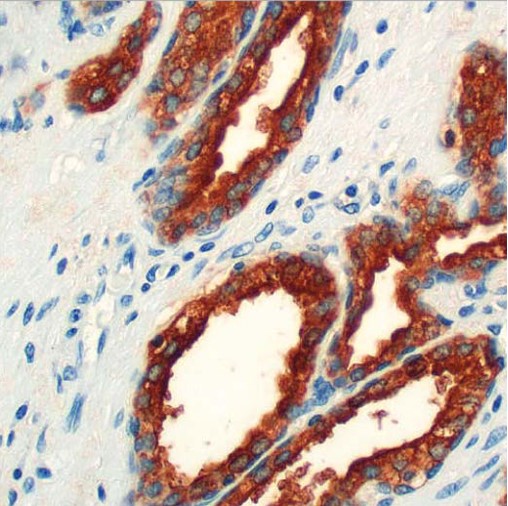Anti-PSAP Antibody (34070)
$236.00
Overview
Product Name Anti-PSAP Antibody (34070)
Description Anti-PSAP Mouse Monoclonal Antibody
Target PSAP
Species Reactivity Human
Applications IHC
Host Mouse
Clonality Monoclonal
Clone ID G655.1
Isotype IgG1
Immunogen Recombinant human PSAP.
Properties
Form Liquid
Concentration Lot Specific
Formulation Tris buffer, pH 7.3-7.7, 1% BSA,
Buffer Formulation Tris
Buffer pH pH 7.3-7.7
Buffer Protein Stabilizer 1% Bovine Serum Albumin
Format Purified
Purification Purified by immunoaffinity chromatography
Specificity Information
Specificity Human PSAP. Reactivity with other species has not been investigated.
Target Name Prosaposin
Target ID PSAP
Uniprot ID P07602
Alternative Names Proactivator polypeptide [Cleaved into: Saposin-A
Gene Name PSAP
Sequence Location Lysosome
Biological Function Saposin-A and saposin-C stimulate the hydrolysis of glucosylceramide by beta-glucosylceramidase (EC 3.2.1.45) and galactosylceramide by beta-galactosylceramidase (EC 3.2.1.46). Saposin-C apparently acts by combining with the enzyme and acidic lipid to form an activated complex, rather than by solubilizing the substrate.; Saposin-B stimulates the hydrolysis of galacto-cerebroside sulfate by arylsulfatase A (EC 3.1.6.8), GM1 gangliosides by beta-galactosidase (EC 3.2.1.23) and globotriaosylceramide by alpha-galactosidase A (EC 3.2.1.22). Saposin-B forms a solubilizing complex with the substrates of the sphingolipid hydrolases.; Saposin-D is a specific sphingomyelin phosphodiesterase activator (EC 3.1.4.12).; [Prosaposin]: Behaves as a myelinotrophic and neurotrophic factor, these effects are mediated by its G-protein-coupled receptors, GPR37 and GPR37L1, undergoing ligand-mediated internalization followed by ERK phosphorylation signaling. {UniProtKB:Q61207, PubMed:10383054}.; Saposins are specific low-molecular mass non-enzymic proteins, they participate in the lysosomal degradation of sphingolipids, which takes place by the sequential action of specific hydrolases.
Research Areas Cancer research
Background Prostatic Specific Acid Phosphatase (PSAP) is an enzyme found in the glandular epithelium of the prostate. PSAP levels are elevated in hyperplastic prostate and prostate carcinoma with the highest levels being detected in metastasized prostate cancer. Moderate overexpression of PSAP is also characteristic of diseases of the bone (such as Paget's disease or hyperparathyroidism), diseases of blood cells (such as sickle-cell disease), multiple myeloma, or lysosomal storage diseases such as Gaucher's disease.
Application Images


Description Immunohistochemistry: use at a dilution of 1:100-1:200 on formalin-fixed, paraffin-embedded samples after heat-induced epitope retrieval at pH 9 for 10-30 minutes. Detection of PSAP in human prostate with #34070 diluted 1:100-1:200.
Handling
Storage Store at 2-8°C. Do not freeze.
Dilution Instructions Dilute in PBS or medium that is identical to that used in the assay system.
Application Instructions
Immunohistochemistry: use at a dilution of 1:100-1:200 on formalin-fixed, paraffin-embedded samples after heat-induced epitope retrieval at pH 9 for 10-30 minutes.
Immunohistochemistry: use at a dilution of 1:100-1:200 on formalin-fixed, paraffin-embedded samples after heat-induced epitope retrieval at pH 9 for 10-30 minutes.
References & Data Sheet
Data Sheet  Download PDF Data Sheet
Download PDF Data Sheet
 Download PDF Data Sheet
Download PDF Data Sheet


